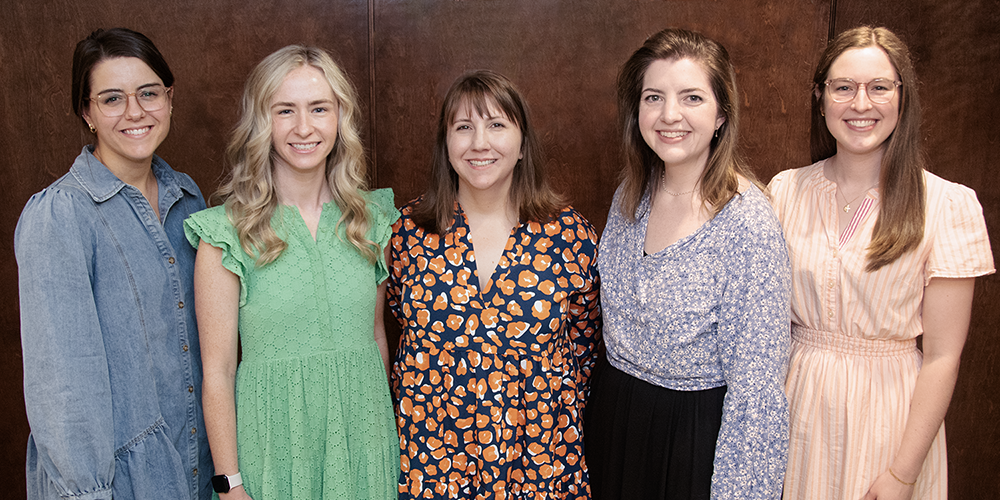The UAB Hospice & Palliative Medicine Fellowship Program has been training leaders in palliative care since 2000, making it one of the oldest and most established training programs in the country.

To date, we have trained over 60 fellows from across the country, some directly out of residency training and others mid-career. Our one-year ACGME-accredited fellowship offers a rigorous interdisciplinary education in palliative care at UAB Hospitals, the Birmingham VA Medical Center, and Children's of Alabama.
Fellowship Experience
Fellows receive training in the outpatient setting through several outpatient clinics, through telehealth and home-based palliative care, and through partnerships with community hospices and long term care facilities. The balance and breadth of experience ensure that fellows are ready to practice in the inpatient, ambulatory, or hospice settings upon completion of the fellowship training.
Fellows will spend one week each month in outpatient Palliative Care. During this week, they will have a one-day continuity clinic and spend the remaining days with the House Calls team, other outpatient providers, and Hospice partners.
Clinical Rotations
 UAB is a highly walkable campus, making it easy to navigate your clinical rotations. Many of our clinical training sites are connected by skybridges, offering protection from rain, heat, and traffic. Browse these buildings to learn more about the types of training conducted there.
UAB is a highly walkable campus, making it easy to navigate your clinical rotations. Many of our clinical training sites are connected by skybridges, offering protection from rain, heat, and traffic. Browse these buildings to learn more about the types of training conducted there.
Explore our training sitesOpens an external link.
We offer a one-year clinical fellowship with 4 adult and 1 pediatric track positions.
Teaching Conferences
Didactic sessions are held weekly and are paired with readings from a seminal text and key articles in palliative medicine. Fellows may attend Grand Rounds in various specialties throughout the week as per their area of interest.
Research Opportunites
Fellows have ample protected time to learn from one another and from faculty within our Division and across the UAB medical campus. In addition to clinical skills, the curriculum includes training in palliative research methodology and quality improvement, teaching skills, and palliative care and hospice business and administration.
Let's get acquainted
It's not just what you learn. It's also about the people you learn with. Our Geriatric Medicine fellowship program leaders are dedicated to developing the potential of every talented trainee.
Meet our people
Program Signaling
UAB Hospice & Palliative Medicine Fellowship is participating in ERAS signaling this year and will consider signals as one element of our holistic application review, including experiences, attributes, competencies, academic or scholarly metrics, letters of recommendation, and personal statement. Signaling is not required for consideration, and all applications are reviewed fully.
Frequently Asked Questions
-
What will I need to apply?
All applications are reviewed via Electronic Residency Application Service® (ERAS). For Palliative Care, #1007540F0. For Palliative Care Med/Peds, #1007540F1. The following documents are required:
-
Current CV (updated within 3 months)
-
Medical School Transcripts (and diploma if requested)
-
Medical School Dean’s Letter
-
Three (3) total Letters of Recommendation (including former program directors)
-
Certificate/verification from previous residency training
-
Must be eligible for Alabama Medical License and Alabama Controlled Substance Certificate (all step scores completed at the time of application)
-
Must be eligible for Federal DEA registration
-
Valid ECFMG Certificate (IMG only)
We do not accept any addtional documents outside of ERAS submissions.
-
-
What are the salaries & benefits for fellows?
Our program provides benefits and insurance plans available to all fellows at UAB. You can find the list of salaries and benefits for fellows based on PGY level here.
-
What is the cost of living in Birmingham?
Birmingham offers a vibrant urban lifestyle at a cost that’s approximately 9% below the national average. Trainees enjoy access to thriving neighborhoods, a nationally recognized food scene, and a dynamic creative community.
-
Is there a minimum USMLE score required?
There is no minimum USMLE score requirement. We take the score into account as part of the overall review of an application.
-
What are the key program dates for Applications?
Applications Open and Close — June through May: Apply through ERAS
Applications Reviewed — July, must be available by August 1
Interview Invitations Released — last week in August
Interviews Begin — September and continue through October
Match Day — November
Fellowship begins — July 1
-
Do you sponsor H1B or J1 Visas?
Yes, the division can sponsor these Visas.
Want to learn more? Start a conversation with us.
 I'd be delighted to talk with you about the many exciting possibilities that await you at UAB and Birmingham. Contact me for more details about your fellowship.
I'd be delighted to talk with you about the many exciting possibilities that await you at UAB and Birmingham. Contact me for more details about your fellowship.
Elizabeth McAlister, Education Administrator
Send an Email
 I'm always ready to answer questions about our comprehensive, scientific, and individualized approach to train future clinicians and researchers.
I'm always ready to answer questions about our comprehensive, scientific, and individualized approach to train future clinicians and researchers.
Walter Baehr, M.D., Assistant Professor of Medicine
Send an Email